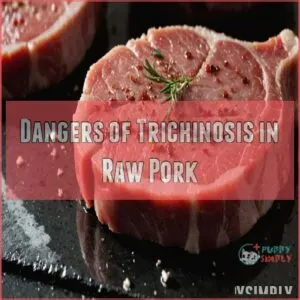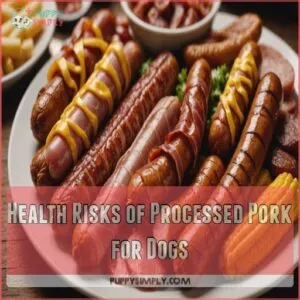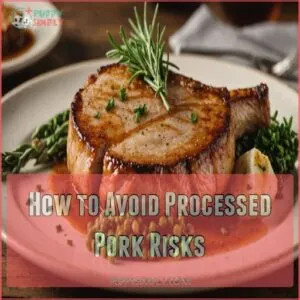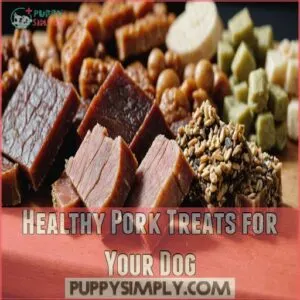This site is supported by our readers. We may earn a commission, at no cost to you, if you purchase through links.
 You might wonder, can dogs eat pork chops?
You might wonder, can dogs eat pork chops?
The answer is yes, but with a few caveats.
Plain, cooked pork chops can be a tasty treat for your furry friend.
Just skip the seasoning and spices—onion powder and nutmeg are definite no-nos as they’re toxic to dogs!
It’s also wise to avoid giving bones, as they can splinter and cause harm.
Remember, moderation is key; too much pork could upset their tummy.
Treat your pup like royalty, but keep it simple.
Curious about more dog-friendly foods?
There’s a world of safe options just waiting to be explored.
Table Of Contents
- Key Takeaways
- Can Dogs Eat Pork Chops Safely
- Risks of Feeding Raw or Processed Pork
- Choosing The Right Pork for Your Dog
- Pork Chops Vs Other Protein Sources
- Safety Guidelines for Feeding Pork Chops
- Healthy Pork Treats for Your Dog
- Frequently Asked Questions (FAQs)
- Can dogs eat cooked pork chops?
- What meat should dogs not eat?
- How much pork is too much for a dog?
- What dogs Cannot eat pork?
- How much pork can dogs eat weekly?
- Are pork chops suitable for puppies?
- Can organic pork be better for dogs?
- Do pork additives affect dog health?
- How to store leftover pork for dogs?
- Conclusion
Key Takeaways
- Make sure you serve your dog plain, thoroughly cooked pork chops without any seasoning or bones to keep them safe.
- Remember, moderation is key; don’t overfeed pork, as it might cause digestive trouble or weight gain.
- Always steer clear of raw or processed pork due to the risks of trichinosis and harmful additives like excess salt.
- Consider rotating pork with other protein sources like chicken or fish to keep your dog’s diet varied and balanced.
Can Dogs Eat Pork Chops Safely
If you’re wondering whether your furry friend can enjoy pork chops, be sure to check their expiration date to avoid risks of spoiled meat that can cause food poisoning. You’ll be happy to know that dogs can safely eat plain, thoroughly cooked pork chops without seasonings or bones.
While pork chops can be a protein-rich treat for your pup, you’ll need to follow some important safety guidelines to make sure they’re properly prepared and served in moderation.
Benefits of Pork Chops for Dogs
While your pup might drool at the sight of pork chops, they can actually be a healthy addition to their diet when prepared correctly.
You can even find a variety of dog pork chops products online, such as on websites that sell dog pork chops, to make mealtime more convenient.
Here’s why plain, cooked pork chops can benefit your furry friend:
- Provides an easily digestible protein that supports muscle growth
- Contains omega-3 fatty acids that promote healthy skin and coat
- Offers a tasty alternative to chicken or beef when your dog needs variety
Nutritional Value of Pork Chops for Dogs
Pork chops pack a powerful nutritional punch for your four-legged friend.
You’ll find they’re loaded with high-quality protein and essential amino acids that help maintain your dog’s muscle health.
These tasty cuts also deliver a solid dose of vitamin B12, thiamine, and omega-3 fatty acids – great for keeping your pup’s skin healthy and joints moving smoothly.
Plus, they’re surprisingly easy for most dogs to digest.
How to Cook Pork Chops for Dogs
To keep your furry friend safe and satisfied, cook pork chops thoroughly at 145°F (63°C) until there’s no pink in the middle.
Trim excess fat and remove all bones before serving.
Skip the seasonings – plain is perfect for pups.
Cut the meat into bite-sized pieces appropriate for your dog’s size.
Let it cool completely before adding it to their bowl.
Precautions for Feeding Pork Chops to Dogs
Now that you’ve got the cooking basics down, let’s talk safety.
Before serving pork chops to your furry friend, remove all bones carefully – they’re a real choking hazard.
Start with small portions to check for allergies, and watch for signs of upset stomach.
Remember every dog is different: what works for your neighbor’s Lab mightn’t suit your Chihuahua.
Keep treats to 10% of daily calories.
Risks of Feeding Raw or Processed Pork
You’ll want to think twice before feeding your dog raw bones, especially chicken bones that can cause obstruction and tearing, or raw or processed pork, as these forms can harbor dangerous parasites and unhealthy additives that could make your furry friend sick.
While you might be tempted to share that leftover bacon or deli meat with your pup, processed pork products are typically loaded with salt and fat that can lead to serious health issues like pancreatitis.
Dangers of Trichinosis in Raw Pork
Raw pork harbors a nasty surprise called Trichinella spiralis larvae, which can cause trichinosis in your furry friend.
This parasitic infection isn’t something you want to gamble with, especially with puppies.
Here’s what trichinosis can do to your dog:
- Trigger severe muscle pain and stiffness, making your pup feel like they’ve run a marathon
- Cause upset stomach, vomiting, and diarrhea
- Lead to extreme fatigue and lethargy, turning your energetic buddy into a couch potato
Health Risks of Processed Pork for Dogs
While raw pork poses risks, processed pork products bring their own set of concerns for your furry friend.
Let’s break down what you need to watch out for:
| Processed Item | Main Health Risks |
|---|---|
| Bacon | High fat, pancreatitis risk |
| Ham | Excessive sodium, dehydration |
| Salami | Harmful preservatives |
| Sausage | Seasonings, spices (toxic) |
| Hot Dogs | Artificial additives |
These processed meats pack unhealthy levels of salt and fat that can trigger pancreatitis in your pup.
How to Avoid Processed Pork Risks
Processed pork can be a sneaky foe in your dog’s diet, especially when it comes to raw options like raw pork ribs risks.
To dodge its dangers, here’s what you need:
- Study food labels like a detective – seek out hidden salt and fat.
- Choose safe pork alternatives, like plain cooked pork.
- Craft homemade pork treats for complete control.
- Consult your vet for personalized advice.
Choosing The Right Pork for Your Dog
When choosing pork for your dog, it’s important to opt for lean cuts that are properly cooked and plain, without any harmful seasonings.
This will keep your dog safe and also prevent them from making frequent trips to the vet—and your wallet will thank you!
What to Look for in Cooked Pork
When choosing cooked pork for your dog, thorough cooking is key.
Look for a nice, even brown color throughout, ensuring a safe Cooking Time.
Check the Fat Content; leaner cuts are better.
Remember Bone Removal – no splinters!
Finally, always do a Seasoning Check; avoid anything extra.
Safe pork for dogs means plain, well-cooked meat.
How to Select Lean and Healthy Pork
Choosing lean and healthy pork starts with understanding fat content and pork quality.
Opt for pasture-raised pork, which is highly digestible and nutritious.
Pick pork chops that are lean cuts, avoiding visible fat.
When considering brands, opt for reputable ones ensuring quality.
To ensure safe feeding, it’s essential to cook pork thoroughly, avoiding raw pork risks. Simple cooking methods like boiling or baking keep pork chops safe for dogs.
Remember, cooked pork is best for a dog diet that’s both delicious and nutritious.
Tips for Introducing Pork to Your Dog’s Diet
Finding lean and healthy pork is just the start.
Introduce pork to your dog’s diet gradually to avoid any tummy troubles.
Start with small portions of cooked pork, ensuring bone removal to prevent choking.
Watch for signs of pork allergy like itching or digestive upset.
Adjust frequency based on your dog’s health.
Monitor digestion to keep them happy and healthy.
Pork Chops Vs Other Protein Sources
When you’re deciding on the best protein source for your dog, comparing pork chops with other options like chicken and beef is essential.
Each has its nutritional perks, but not all proteins suit every pup’s needs, so knowing the differences can help you make the best choice for your furry friend.
Comparison With Chicken and Beef
You might wonder whether pork chops stand tall against chicken and beef.
As a protein source, pork provides essential nutrients, comparable to chicken and beef, but each has its quirks.
Chicken is leaner, and beef boasts richness.
Cook pork thoroughly to dodge safety concerns.
Dogs should avoid certain foods like cooked lamb bones, which can cause digestive damage and splinters. Dogs eat pork for dietary benefits, but moderation is key to avoid health issues.
Alternative Protein Sources for Dogs
When exploring dog food protein options, consider alternative protein sources.
Chicken and beef are popular, but don’t overlook:
- Fish: Rich in omega-3s, benefits skin and joints.
- Lamb: Great for dogs needing a hypoallergenic diet.
- Vegetarian Options: For meat-sensitive pups.
- Pork: Tasty choice if properly cooked and served occasionally.
These alternatives provide various nutrients while spicing up your dog’s meals.
How to Rotate Protein Sources for Dogs
Switching up your dog’s protein sources is like giving them a new ball to chase.
Dogs benefit from variety, preventing potential allergies and keeping meals exciting.
Here’s a quick guide:
| Protein Source | Benefits |
|---|---|
| Pork Chops | Rich in nutrients |
| Chicken | Low fat |
| Salmon | Omega-3 packed |
Keep meals interesting and balanced; your pup will love it!
Safety Guidelines for Feeding Pork Chops
Giving your dog pork chops? Make sure they’re fully cooked, boneless, and completely free of seasonings – those spices aren’t always pup-friendly!
Remember to always supervise your dog while they eat and consult your vet before adding any new foods to their diet, especially if they’ve any health concerns.
Precautions for Puppies and Senior Dogs
Though pork chops can be tasty, puppies and senior dogs need extra care.
Young pups and older dogs are more prone to digestive issues and food sensitivities, so moderation is key.
Fully cooked pork chops, free from bones and seasonings, help protect against trichinosis and support dental health.
Prioritize bone strength and consult your vet.
How to Avoid Choking Hazards With Pork Bones
While puppies and senior dogs need extra care, all dogs can face risks from pork bones.
If you’re looking for a safer option, consider exploring pork bone alternatives online, such as pork bone alternatives.
Cooked bones can splinter easily, becoming a choking hazard or causing internal damage.
It’s best to remove bones before feeding.
Look for safe alternatives, like specially designed dental treats, to keep your furry friend happy and safe without the worry of choking.
Tips for Storing and Handling Pork Safely
Avoiding choking hazards with pork bones is just the start.
Handling pork safely means minding a few basics:
- Refrigerate pork chops at 40°F or below to avoid spoiling.
- Freeze cooked pork if not used within three days.
- Thaw in the fridge to prevent cross-contamination.
- Cook thoroughly to kill trichinella parasites.
Stay safe and worry-free!
Healthy Pork Treats for Your Dog
When picking pork treats for your dog, choose high-quality options like Stella & Chewy’s Meal Mixers or Premium Pork Chomps for a safe and tasty reward.
These treats offer a delicious way to show your furry friend some love without risking their health.
Review of Stella & Chewy’s Meal Mixers Purely Pork
Stella & Chewy’s Meal Mixers Purely Pork is like a nutrition booster shot for your pup’s meals.
The single-ingredient magic focuses on high-quality, cooked pork to jazz up your dog’s daily diet, making it a healthier alternative to high-fat human treats.
Watching your dog’s reaction as they munch on it is pure joy.
The price is fair for the health benefits it serves up, making it a go-to choice.
Review of Premium Pork Chomps Roasted Pork Ribz
Premium Pork Chomps Roasted Pork Ribz might just be the treat your dog’s tail wags for.
With ingredients offering a savory taste and chewy texture, these ribs seem to please most pups’ palates.
Dogs enjoy them, but remember moderation is key for maintaining dog health and nutrition.
The value for money is decent, making it a worthwhile option in your pork for dogs repertoire.
Review of Full Moon Sliced Pork Jerky Treats
Full Moon Sliced Pork Jerky Treats offer a different texture than Premium Pork Chomps.
Let’s see what your pup thinks!
You’ll want to check out these key things:
- Ingredient analysis: Is it mostly pork?
- Taste test: Does your dog gobble it up?
- Dog reaction: Any tummy troubles?
You can find similar products like these treats on websites that specialize in Pork Jerky Treats online.
These jerky treats might be a hit, but remember moderation is key when giving your dog pork treats.
A little goes a long way!
Frequently Asked Questions (FAQs)
Can dogs eat cooked pork chops?
Sure, your pup can enjoy cooked pork chops if they’re plain, well-cooked, and bones removed.
They shouldn’t contain any seasonings, especially harmful ones like garlic or onion, ensuring a safe treat in moderation.
What meat should dogs not eat?
When considering what meats are safe for your dog, remember to avoid giving them turkey bones splinters, as they can cause serious harm. Avoid feeding dogs raw pork, as it can lead to trichinosis.
Also, steer clear of processed meats like salami and bacon, which are high in salt and fat.
Always consult your vet for safe options.
How much pork is too much for a dog?
For dogs, moderation is key with pork.
Too much can lead to weight gain due to high fat content.
Stick to occasional treats, ensuring the pork is cooked plainly without seasoning.
Consult your vet for specific guidance.
What dogs Cannot eat pork?
Dogs shouldn’t eat raw or undercooked pork due to trichinosis risk, as learn about trichinosis symptoms. Dogs shouldn’t eat raw or undercooked pork due to trichinosis risk.
Processed pork like salami contains harmful salts and spices.
Pre-seasoned pork often has toxic ingredients.
Cooked pork, if plain, is safer occasionally.
How much pork can dogs eat weekly?
Don’t worry, a little pork won’t hurt!
A small amount of cooked, plain pork chop, maybe once or twice a week, is usually fine.
Always check with your vet first, though!
They’ll give you the best advice for your pup.
Are pork chops suitable for puppies?
Pork chops can be okay for puppies if cooked thoroughly, plain, and boneless.
Puppies are more vulnerable to new foods, so start small.
Always talk to your vet first to make sure it’s safe for your little buddy.
Can organic pork be better for dogs?
Thinking organic pork is safer for dogs isn’t entirely accurate.
While it avoids pesticides and hormones, you still must cook it thoroughly, skip the seasonings, and serve in moderation.
Always consult your vet about dietary changes.
Do pork additives affect dog health?
Yes, pork additives can harm your dog’s health.
Additives like garlic, onion, or excess sodium found in pre-seasoned pork can cause digestive and health issues.
Always check ingredient lists and consult your vet before feeding new foods.
How to store leftover pork for dogs?
Picture leftovers tucked neatly away, like treasures awaiting discovery.
Store cooked pork chops in airtight containers in the fridge for up to three days.
Freeze for longer storage.
Always make sure they’re plain, cooked thoroughly, and bone-free for safety.
Conclusion
Regarding feeding pork chops to your beloved pup, it’s best to err on the side of caution.
While plain, cooked pork chops are generally safe, remember to steer clear of seasonings and bones.
Sparing them a taste now and then can add variety without upsetting their stomach.
Just like variety is the spice of life, rotating with other protein sources keeps your dog’s menu interesting and balanced.
Always prioritize safety to keep your furry friend healthy and happy.
















